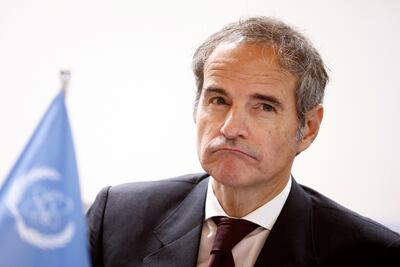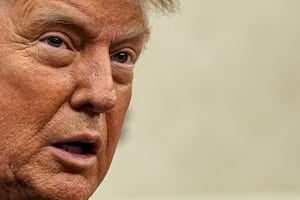Iran warned the Middle East that the threat of war have not yet passed, and expressed “serious doubts” over whether a ceasefire with Israel will hold.
Saudi Defence Minister Prince Khalid bin Salman on Sunday spoke to Iran's army chief Maj Gen Abdolrahim Mousavi in a push for “security and stability”, the Saudi Press Agency said.
According to Iranian state media, Maj Gen Mousavi voiced “serious doubts about the enemy’s commitment to its obligations, including the ceasefire”. He said Iran's armed forces are prepared to deliver a firm response "if aggression is repeated.”
The head of the UN's nuclear inspections agency, Rafael Grossi, said Iran could resume enriching uranium “in a matter of months”. He warned in a CBS News interview broadcast on Sunday that “one cannot claim that everything has disappeared and there is nothing there”.

Israel mounted a surprise attack on Iran on June 13, killing senior commanders and firing missiles at military and government sites. Iran retaliated with missiles and drones, before the conflict culminated in a US bombing of Iranian nuclear sites and Tehran's attack on Al Udeid, an American airbase in Qatar. A ceasefire has held since then.
In a letter to UN Secretary General Antonio Guterres, Iran's Foreign Minister Abbas Araghchi called on the UN Security Council to declare Israel and US as “initiators of the act of aggression”, making them liable for compensation.
He called the war a “brazen assault on the very foundations of international law”. The US holds veto power on the council, making any such resolution unlikely. President Donald Trump has defended the unprecedented bombing of Iran as a decisive blow against its alleged nuclear weapons programme, although there are doubts over how much damage was caused.
Iran denies it is developing an atomic weapon, but talks with the US on limiting its nuclear activities had failed to produce a deal before Israel took military action.

The UAE has urged Iran to restore trust with Gulf states after last week's attack on Al Udeid airbase in Qatar.
Dr Anwar Gargash, diplomatic adviser to President Sheikh Mohamed, said on Saturday that Gulf states “took a strong and influential stand against the Israeli war on Iran” and had sought to de-escalate tension.
“Despite this, Iran targeted the sovereignty of the sisterly state of Qatar, a targeting that affects us all,” he said. “Today, as we turn the page on the war, Tehran remains called upon to restore trust with its Gulf neighbours, which was damaged by this aggression.”
Mr Trump's envoy to Turkey, Thomas Barrack, said the war could pave the way for a new Middle East, as the US pushes for more Arab states to bury the hatchet with Israel.
"What just happened between Israel and Iran is an opportunity for all of us to say 'time out, let's create a new road'," Mr Barrack told Turkey's Anadolu state news agency."The Middle East is ready to have a new dialogue, people are tired of the same old story," he added.
A ceasefire in Gaza, meanwhile, remains elusive. Nine children were among 20 Palestinians reported dead when an air strike hit a group of people near a school on Saturday night.
Mr Trump urged negotiators to “make the deal in Gaza” in a social media post early on Sunday. The US, Qatar and Egypt have been trying to broker a truce since an earlier arrangement collapsed in mid-March.
Israel blockaded aid to Gaza for more than two months, worsening a humanitarian crisis. Aid deliveries via the privately run Gaza Humanitarian Foundation have been marred by chaotic scenes and allegations of killings.
The foundation on Sunday denied claims by Gaza authorities that opioid pills were found in bags of flour delivered to Palestinians.



